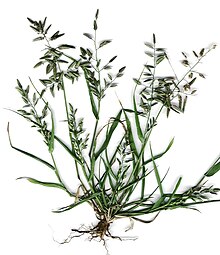Macroblepharus
| Lovegrass | |
|---|---|
 |
|
|
Eragrostis cilianensis Maui, Hawai'i |
|
| Scientific classification | |
| Kingdom: | Plantae |
| (unranked): | Angiosperms |
| (unranked): | Monocots |
| (unranked): | Commelinids |
| Order: | Poales |
| Family: | Poaceae |
| Subfamily: | Chloridoideae |
| Tribe: | Eragrostideae |
| Genus: |
Eragrostis Wolf |
| Type species | |
|
Eragrostis eragrostis (syn of E. cilianensis) (L.) Wolf |
|
| Synonyms | |
|
|
Eragrostis is a large and widespread genus of plants in the grass family, found in many countries on all inhabited continents and many islands.
Eragrostis is commonly known as lovegrass or canegrass. The name of the genus is derived from the Greek words ἔρως (eros), meaning "love", and ἄγρωστις (agrostis), meaning "grass".
Lovegrass is commonly used as fodder. The seeds appear to be of high nutritional value for some animals, but they are also very tiny and collecting them for human food is cumbersome and hence uncommon. A notable exception is teff (E. tef), which is used to make traditional breads on the Horn of Africa, such as Ethiopian injera and Somalian laxoox. It is a crop of commercial importance. E. clelandii and E. tremula are recorded as famine foods in Australia and Chad, respectively.
Other species, such as E. amabilis, are used as ornamental plants. E. cynosuroides is used in the pūjā rites in the Hindu temple at Karighatta. Bahia lovegrass (E. bahiensis) is known as a hyperaccumulator of caesium-137 and can be grown to remove the highly toxic radioactive atoms from the environment. Weeping lovegrass (E. curvula) has been planted extensively to prevent soil erosion.
...
Wikipedia
